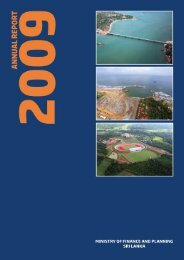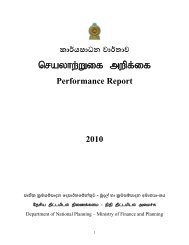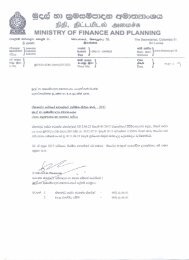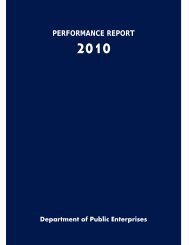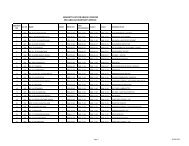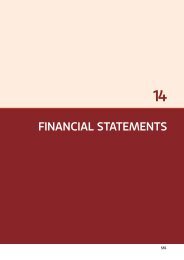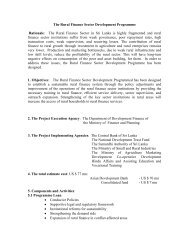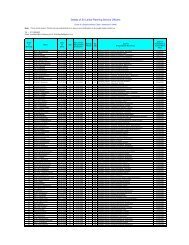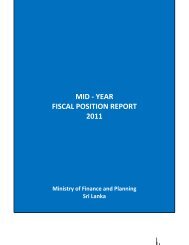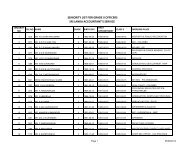Annual Report 2008 - Ministry of Finance and Planning
Annual Report 2008 - Ministry of Finance and Planning
Annual Report 2008 - Ministry of Finance and Planning
Create successful ePaper yourself
Turn your PDF publications into a flip-book with our unique Google optimized e-Paper software.
4. Reform Initiatives<br />
175<br />
under SAFTA for developing member countries as well<br />
as for least developed member countries <strong>of</strong> SAARC were<br />
implemented. In addition, certain tariff revisions required in<br />
terms <strong>of</strong> various policy changes <strong>of</strong> the Government in order<br />
to provide an impetus to local industries <strong>and</strong> further improve<br />
domestic economic activities were also introduced in <strong>2008</strong><br />
after a process <strong>of</strong> stakeholder consultations.<br />
Revision <strong>of</strong> bus <strong>and</strong> railway fares <strong>and</strong> electricity <strong>and</strong> water<br />
tariffs, effected during <strong>2008</strong>/ early 2009 are notable pricing<br />
reforms implemented in <strong>2008</strong>. Having commenced in 2001.<br />
200 busses were made road worthy, improving public sector<br />
transport more efficient.<br />
For the first time since 2005 August, railway fares were<br />
revised on average by 61 per cent in March <strong>2008</strong> with a view<br />
to reduce operational losses. Marking a notable improvement<br />
in the recent history <strong>of</strong> Railways, around 100 carriages<br />
<strong>and</strong> several diesel locomotives were added to the existing<br />
fleet, strengthening railway service delivery. Significant<br />
improvements were made to railway tracks, signal system<br />
as well railway bridges.<br />
The National Transport Commission proceeded to revise bus<br />
fares in March <strong>2008</strong> in the backdrop <strong>of</strong> high costs impacting<br />
the transportation sector by stipulating maximum bus fare<br />
for specified distances. With this revision the Private Sector<br />
Bus fares on average increased by 27.2 percent while the<br />
public sector fares were increased by an average <strong>of</strong> 19<br />
per cent. Further, the National Transport Commission has<br />
since May <strong>2008</strong> introduced integrated rotated timetables<br />
for operators on long-distance bus routes. These timetables<br />
have provided for the dispatch <strong>of</strong> buses on the basis <strong>of</strong><br />
the actual observed dem<strong>and</strong> patterns, where both state<br />
owned <strong>and</strong> private buses have been integrated to reduce<br />
any over supply <strong>and</strong> intense on-road competition with each<br />
other. In the case <strong>of</strong> the private sector which is made up<br />
<strong>of</strong> individual operators, time slots are rotated daily so that<br />
all operators would be provided with an equitable chance<br />
<strong>of</strong> earning revenue. These time tables have also resulted in<br />
reducing illegal operations, accidents, intense over loading<br />
etc. Further since April 2009, pilot bus companies have been<br />
registered <strong>and</strong> allowed to h<strong>and</strong>le supervised management<br />
<strong>of</strong> time tables, public relations, public complaints etc. as<br />
a move to improve the management <strong>of</strong> bus routes. The<br />
<strong>Ministry</strong> <strong>of</strong> Transport together with the National Transport<br />
Commission has finalized a Policy Documents on Transport<br />
in <strong>2008</strong>. This sets out intended reforms in terms <strong>of</strong> expansion<br />
<strong>of</strong> regulation to cover all modes <strong>of</strong> transport, studies were<br />
carried out on how transport planning could be used to<br />
manage urban congestion through more efficient road<br />
utilization <strong>and</strong> promotion <strong>of</strong> public transport. More than 200<br />
new buses were added to the existing fleet while a further<br />
In the water sector, the Water Board had taken steps to ensure<br />
its commercial viability. Costs associated with the provision<br />
<strong>of</strong> pipe borne water showed a continuous increase over the<br />
past years <strong>and</strong> in <strong>2008</strong> it recorded a 13 per cent increase<br />
over 2007. In this backdrop, adjusting water tariff was felt<br />
as an acute need to recover a larger portion <strong>of</strong> the cost <strong>of</strong><br />
operations & maintenance <strong>and</strong> also to explore the possibility<br />
<strong>of</strong> reinvestment on assets. Havin made findings in <strong>2008</strong>, the<br />
water Board revised its tariff from January 2009 to reduce the<br />
prevailing gap between the cost <strong>of</strong> delivery <strong>and</strong> the amount<br />
recovered from consumers after giving a cash grant to the<br />
vulnerable groups <strong>of</strong> the society to be able to meet related<br />
costs. Although prior to <strong>2008</strong>, the cost <strong>of</strong> operations <strong>of</strong> the<br />
sewerage network <strong>of</strong> the Water Board was recovered from<br />
the income derived from national water tariff, with effect<br />
from April <strong>2008</strong>, a national tariff was introduced for 10,000<br />
consumers who have sewerage connections managed by<br />
the Water Board outside Colombo. Water Board has earned<br />
around Rs. 30 Mn. in <strong>2008</strong> through this measure <strong>and</strong> has<br />
consequently been able to recover 18 percent <strong>of</strong> the cost <strong>of</strong><br />
its sewerage operations. With a view to increase the overall<br />
efficiency in operations <strong>of</strong> the Water Board, a program is in<br />
place from <strong>2008</strong> stipulating operational performance targets<br />
to its regional centers.<br />
Work in relation to the finalization <strong>of</strong> a new Electricity Act<br />
was completed in <strong>2008</strong>. The Act inter alia provides for the<br />
regulation <strong>of</strong> generation, transmission, distribution, supply<br />
<strong>and</strong> use <strong>of</strong> electricity in order to ensure that an economical<br />
<strong>and</strong> efficient service is provided to consumers. The Act<br />
<strong>Ministry</strong> <strong>of</strong> <strong>Finance</strong> <strong>and</strong> <strong>Planning</strong> Sri Lanka<br />
<strong>Annual</strong> <strong>Report</strong> <strong>2008</strong>






